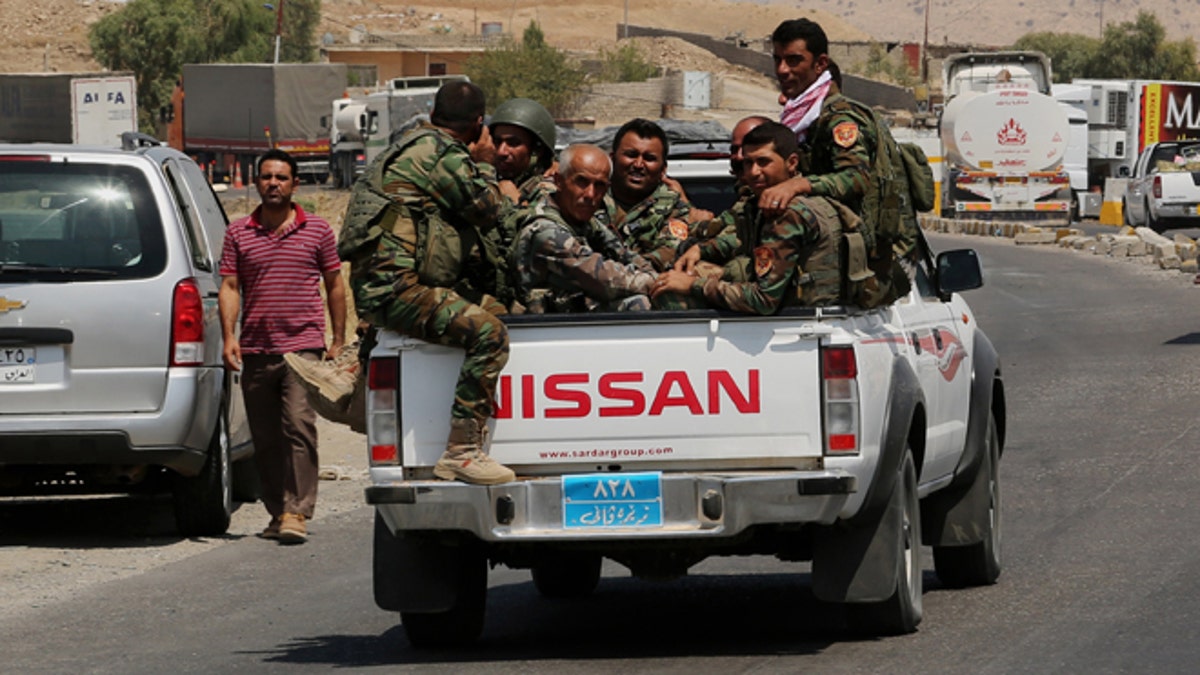
Kurdish forces, known as the Peshmerga, make their way to the front line to fight militants from the extremist Islamic State group at Mosul Dam, outside Mosul, Iraq, Monday, Aug 18, 2014. (AP)
A top Kurdish representative to the U.S. claims that the Obama administration is not doing enough to supply vital advanced weapons to Kurdish peshmerga security forces in their fight against Islamic State militants – amid signs that other nations may be eclipsing the U.S. in their level of support.
"To this point, we have only received light arms, nothing effective against ISIS militants,” Karwan Zebari, director of U.S. congressional affairs for the Kurdish Regional Government (KRG), told Fox News.
“We need effective equipment to go on the offensive. We need to be going after them,” he said, adding: “There are two heads to this snake that need to be cut off. The one in Iraq is Mosul and the other in Syria is Raqqa.”
Kurdistan Regional Government Deputy Prime Minister Qubad Talabani told Fox News' Bret Baier on "Special Report" that the caliber of the weapons that the Islamic State fighters have is far greater than that of the Kurdish forces. He noted that the militants are actually fighting with U.S.-supplied weapons, which they seized from Iraqi troops.
"There is a great imbalance in the weaponry because ISIS have state of-the-art, U.S.-supplied weaponry that they were able to take with ease from the Iraq armed forces," he said.
Currently, the U.S. is providing only ammunition for small arms and mortars and has stopped short of arming the Kurds directly. When asked Wednesday if the White House was planning any changes to its policy, a Defense official told Fox News, “The Department of Defense has not provided direct arms to the Kurds and has no plans to do so in the future."
Zebari cautioned the Pentagon against working with the Iraqi government in Baghdad to facilitate the transfer of arms. "They always slow things down," he said.
Last week, Pentagon spokesman Col. Steve Warren said the focus is “to coordinate this multinational effort to provide munitions.” Defense Secretary Chuck Hagel at the time announced plans for a seven-nation effort to arm the Kurds.
But while the U.S. is going through Baghdad, other nations have already announced plans to directly arm Kurdish fighters, bypassing Baghdad in the process.
Germany, not included in Hagel’s seven-nation alliance, is preparing to provide advanced weaponry, including anti-tank missiles, directly to the Kurds, the German government announced. (Germany abstained from the NATO-led intervention in Libya in 2011 and did not support the invasion of Iraq in 2003.)
British Prime Minister David Cameron also told Parliament on Monday that the United Kingdom – part of the seven-nation group -- has supplied arms directly to the Kurds.
Meanwhile, on the same day Hagel announced the seven-nation effort, Iran’s foreign minister met with Kurdish President Masoud Barzani to announce that Iran was the first to provide weapons to the Kurds. “We asked for weapons and Iran was the first country to provide us with weapons and ammunition,” Barzani said, according to Reuters.
The appeals come as the Obama administration weighs its strategy for addressing ISIS, and the possibility of expanding that campaign into Syria.
Another video emerged Tuesday of an American journalist being executed at the hands of ISIS militants. And last Friday, a video surfaced purporting to show an ISIS militant beheading a Kurdish peshmerga fighter.
President Obama has not given any indication whether the U.S. would expand support for the Kurds.
"I want to make sure everybody is clear on what we’re doing now, because it is limited," Obama said last Thursday. "Our core priority right now is just to make sure that our folks are safe and to do an effective assessment of Iraqi and Kurdish capabilities.”












































